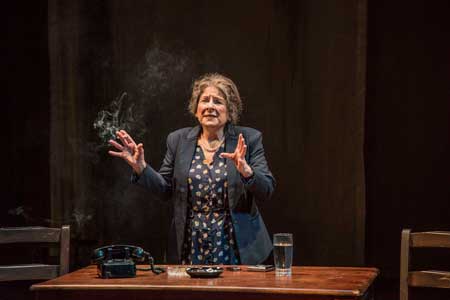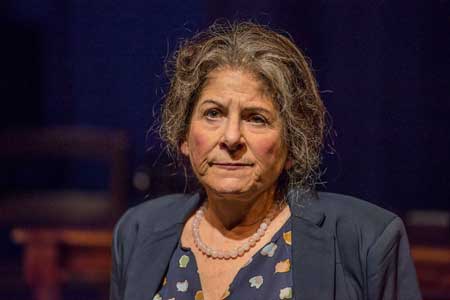Play (2003)
by William Gibson
Directed by Judy Braha
New Repertory Theater
Arsenal Center for the Arts, Watertown, MA
March 25 – April 16, 2017
With Bobbie Steinbach (Golda Meir)

in “Golda’s Balcony”
Photo: Andrew Brilliant / Brilliant Pictures
Courtesy of New Repertory Theater
Golda Meir was Prime Minister of Israel for a relatively short time, from 1969 until 1974, when she stepped down. But what a time that was. She led Israel during one of its most dire conflicts, the Yom Kippur War, which took place for three weeks in October, 1973. Her negotiations with military leaders David Elazar and Moshe Dayan, and with American Secretary of State Henry Kissinger and President Richard Nixon, laid the groundwork for Israel’s eventually prevailing against the multi-pronged attack.
This play, which was a reformulation of Gibson’s earlier, poorly received, Golda (1977), was an enormous success and in 2005 became the longest running play featuring a solo female performance in Broadway history.
Artfully structured, the play interleaves Meir’s dramatic negotiations during the Yom Kippur War with a recounting of her personal history. Each part informs the other, allowing the biography of a young Russian-American Zionist to lay the groundwork for the tough-as-nails stance of the Prime Minister at a time of national crisis.
The personal story is rich, interesting and in its own way heartbreaking. Married at a very young age, 19, to Morris Meyerson, Golda remained principally devoted to Zionism and very secondarily to Morris. Part of the condition of her marriage to Meyerson was that they move to Palestine which they did in 1921. Golda was immediately taken with kibbutz life, Morris less so, and that stark difference of their inclinations spelled the kind of respectful distance they maintained over the several decades of their marriage until Meyerson died while still in his fifties.
This is a stellar production of a very good play.
In this demanding solo performance, Bobbie Steinbach is just out of this world. Steinbach, a seasoned actor who has performed many Shakespearean roles, artfully combines the elements that go into making Golda Meir’s character persuasive. Golda is at once down-to-earth and warm, and, as she herself acknowledges in the script, a strong and determined leader. Steinbach captures it all, conveying Meir’s considerable vulnerability and enormous self-possession. It is truly a remarkable performance.
The staging is simple but effective. Hints of a plaintive movement from a Bach cello suite keep turning up; Golda keeps shouting it down, as though the mournful and reflective quality of the music infuriated the powerhouse personality. A lot of smoking goes on as well (with stage tobacco, for those concerned); Meir without a cigarette would not have been true to life.
Amazingly, the play, though a monologue of 100 minutes, is quite suspenseful. Steinbach certainly keeps it so, and the recurrence of the war theme keeps things hopping as well.

The play ends on a thoughtful, but not necessarily its most effective, note – with Meir approaching the audience and leading it in saying Shalom. It’s a nice sentiment to underline, but it comes across as an odd final note for a play which is based on the recognition that the business of leading a country through war is a grim business. A more subtle narrative gesture towards the same general end would have carried more weight.
– BADMan
Leave a Reply